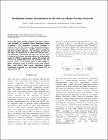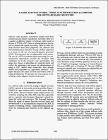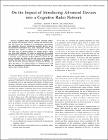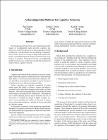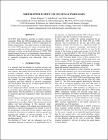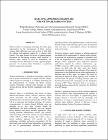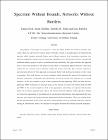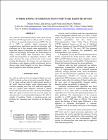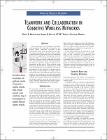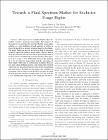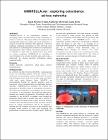Browsing Electronic & Electrical Eng (Scholarly Publications) by Author "DOYLE, LINDA"
Now showing items 21-40 of 40
- Sort by:
- title
- issue date
- submit date
- Order:
- ascending
- descending
- Results:
- 5
- 10
- 20
- 40
- 60
- 80
- 100
-
Learning Nash Equilibria in Distributed Channel Selection for Frequency-Agile Radios
DA SILVA, LUIZ; DOYLE, LINDA; MACALUSO, IRENE (2012)Wireless communication networks are evolving towards self- configuring, autonomous and distributed multiagent systems in which nodes are deployed randomly and have to adapt to the en- vironment in which they operate. A ... -
Mobile context aware stories
DOYLE, LINDA; O'MAHONY, DONAL EDWARD (IEEE, 2002)An interactive narrative is a story that is shaped by digital technology and that allows the dynamic presentation of scenes or sequences based on input from the user. In this paper we present a new foundation for interactive ... -
Modulation scheme classification for 4G software radio wireless networks
DOYLE, LINDA; NOLAN, KEITH EDWARD; O'MAHONY, DONAL EDWARD (2002)This paper describes software radio and a software radio technique for automatic digital modulation scheme recognition. The modulation recognition technique is designed for a real-time software radio using general-pur ... -
A multi-hop ARQ protocol for underwater acoustic networks
DOYLE, LINDA (IEEE, 2007)Underwater acoustic networks are envisaged to be the enabling technology for oceanographic data collection, pollution monitoring, offshore exploration and tactical surveillance applications. Unique characteristics of ... -
A noise adaptive symbol timing synchronization algorithm for software radio receivers
O'MAHONY, DONAL EDWARD; NOLAN, KEITH EDWARD; DOYLE, LINDA (2004)Software radio promises tremendous benefits from both commercial and military standpoints. Currently, there are a number of different 'shades' of software radio based on the use of FPGAs, DSP chips or general-purpose ... -
OFDM sub-carrier allocation algorithm for a multiple user data enhanced radio server (MUDERS) using a general purpose processor platform
DOYLE, LINDA; NOLAN, KEITH EDWARD (2004)This paper presents a novel spectrum-allocation technique designed for a high data-rate and spectrally-efficient multiple-user wireless system. The core of this system is a reconfigurable radio, implemented on a ... -
On the impact of introducing advanced devices into a cognitive radio network
DOYLE, LINDA (IEEE, 2009)Abstract?Cognitive Radio promises better spectrum utilisation through decentralised control, sensing and decision making. The devices are intended to be inexpensive, upgradeable and adaptable. However, introducing ... -
A path forwards for Cognitive Radio research
DOYLE, LINDA (2007)The Cognitive Radio research field has seen great enthusiasm and rapid growth in the number of active researchers, papers published, conference sessions and journal special issues. This paper presents the author's views ... -
A platform for exploring reconfigurability in distributed and disaggregated wireless networks
DOYLE, LINDA (IEEE, 2005)The purpose of this paper is to present an overview of a platform for exploring reconfigurability in wireless networks. The types of networks that are particularly of interest here are distributed and disaggregated ... -
Principles of cognitive network teamwork
DOYLE, LINDA; NOLAN, KEITH EDWARD (2006)This paper looks ahead at the future of wireless communications systems that can combine their resources and capabilities in order to enhance their overall ability to collect and convey information. Cognitive network teamwork ... -
A reconfigurable platform for cognitive networks
DOYLE, LINDA; NOLAN, KEITH EDWARD; SUTTON, PAUL DAVID (IEEE, 2007)By introducing self-awareness and computational intelligence to reconfigurable radio networks, cognitive networks are viewed as the key to a new generation of self-configuring, self-optimizing and self-healing communications ... -
SDR for opportunistic use of UMTS licensed bands
DOYLE, LINDA (2006)The UMTS radio frequency spectrum is a highly expensive commodity. While the UMTS standards make very efficient use of the allocated bands there is however opportunity for further advancements. This paper focuses on ... -
Selecting appropriate hardware For software radio systems
DOYLE, LINDA; NOLAN, KEITH EDWARD; O'MAHONY, DONAL EDWARD (2002)Software radio is an emerging technology that offers great opportunities for the development of future wireless systems. Many different views exist on how to build both the software and hardware required by a software ... -
Small planar monopole covers multiband BRANs
DOYLE, LINDA (2000)The use of a single antenna which can cover a wide range of frequencies is a desirable feature for future wireless communications systems. The emerging self-organising and ad-hoc networks require more than an octave ... -
The social fashioning of emerging communications infrastructures
DOYLE, LINDA (2004)This paper looks at the changing dynamics of the networked experience as new communications infrastructures emerge to support a network body whose disembodied presence is grounded in the necessity of the material. Unlike ... -
Spectrum without Bounds, Networks without Borders
DA SILVA, LUIZ; DOYLE, LINDA; FORDE, TIM (IEEE, 2014)The purpose of this paper is to present a vision for future mobile and wireless networks. The vision, which we call Networks without Borders (NwoB), is based on a market-place of virtual network operators which construct ... -
Symbol timing synchronization in software radio receivers
DOYLE, LINDA; NOLAN, KEITH; O'MAHONY, DONAL (2004)The Centre for Telecommunications Value Chain Driven Research (CTVR) approach to software radio is to focus on the use of a general-purpose processor (GPP). The use of a GPP to perform signal processing for communications ... -
Teamwork and Collaboration in Cognitive Wireless Networks
DOYLE, LINDA; NOLAN, KEITH EDWARD (IEEE Communications Society, 2007)This article looks at the principles and significant potential of teamwork in cognitive networks. These concepts represent a new evolutionary stage in the development of cognitive radio and cognitive networks, where wireless ... -
Towards a fluid spectrum market for exclusive usage rights
DOYLE, LINDA; FORDE, TIM (IEEE, 2007)This paper focuses on highly fluid markets for trading exclusive spectrum usage-rights. The purpose of the paper is to underline the need for flexible usage-rights policies, as a core facilitator of such markets as well ... -
UMBRELLA.net: exploring coincidence ad-hoc networks
DOYLE, LINDA (2004)UMBRELLA.net is an experimental platform for developing ad-hoc networks based around coincidence or chance occurrences. The project utilizes the haphazard and unpredictable patterns of weather and crowd formation as ...






